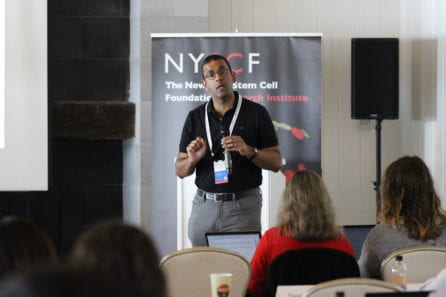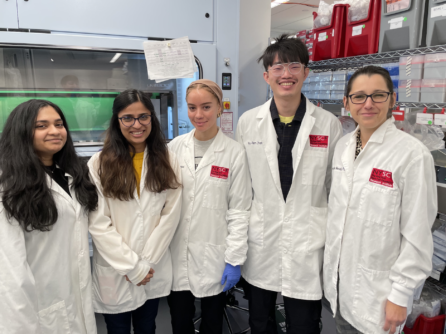World’s First CRISPR-Based Gene Therapy Approved by FDA
NewsIn an exciting step towards a new treatment, an FDA panel has approved a therapy for sickle cell disease that employs CRISPR gene editing. The decision was made following successful results in clinical trials. The same therapy has also recently received approval in the UK for both sickle cell disease and beta thalassemia.

In sickle cell disease, red blood cells produce abnormal hemoglobin and become misshapen and sticky, forming clumps that can clog blood vessels and lead to widespread dysfunction, including intense chronic pain. In the new therapy, scientists isolate blood stem cells from patients and use CRISPR to make a cut at a specific gene called BCL11A which is involved in blood production. By disrupting BCL11A and reintroducing cells into the body, healthy hemoglobin production is restored. The function of this gene in red blood cells was discovered by NYSCF – Robertson Stem Cell Investigator Vijay Sankaran, MD, PhD.

“CRISPR has been applied in many different ways, from research to agriculture to therapeutic development,” noted NYSCF – Robertson Stem Cell Investigator Alumnus and CRISPR pioneer Feng Zhang, PhD, whose lab was the first to demonstrate effective CRISPR gene editing in mammalian cells. “One of the most exciting things is the application of CRISPR for sickle cell disease. Scientists and drug developers have used CRISPR to modify bone marrow stem cells to restore the function of blood cells. And once the cells themselves have been repaired, those cells can be transplanted back into the patient so that they can produce healthy cells.”
The treatment, known as exa-cel (developed by Vertex Pharmaceuticals and CRISPR Therapeutics), is the first-ever approved therapy to employ CRISPR gene editing.
“Gene therapy is our last hope for a cure,” Melissa Nicole Allen, a parent of a sickle cell patient, told The New York Times.
“After I received exa-cel, I started to experience things I had only dreamt of: boundless energy and the ability to recover by merely sleeping,” shared patient Jimi Olaghere in the MIT Technology Review. “My physical symptoms—including a yellowish tint in my eyes caused by the rapid breakdown of malfunctioning red blood cells—virtually disappeared overnight. Most significantly, I gained the confidence that sickle cell disease won’t take me away from my family, and a sense of control over my own destiny.”
NYSCF uses CRISPR to understand how genes influence disease, and in turn, how these effects can be prevented or treated. Our scientists, including Josephine Wesely, PhD, NYSCF Principal Scientist in Functional Genomics, are also using CRISPR to find better therapies for a variety of diseases, including type 1 diabetes.

“This approval is opening doors for gene therapies using the CRISPR technology, and will no doubt help many patients in need,” said Dr. Wesely, who is herself a type 1 diabetes patient. “It is encouraging to see this promising milestone for gene therapies.”
Read more from: